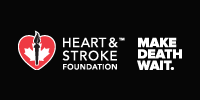
We got an early morning phone call, April 1st, a few years ago. My mother-in-law had suffered a heart attack. I remember thinking, this can’t be happening. Is this some kind of sick, April Fool’s prank? It was no joke.
My in-laws had been out for dinner. Upon returning home, my mother-in-law said she felt unwell: tired, nauseous, with a tight feeling in her chest and abdomen. She’s not one to complain and dismissed it as indigestion. My father-in-law however, didn't dismiss anything. He quickly gave her an aspirin {which he had her chew for quicker absorption} and called 911. He recognized she was having a possible heart attack.
Paramedics arrived, assessed the situation and took her to hospital immediately. She was in the midst of cardiac arrest. If she had gone any longer without medical attention, she surely would have died.
She never would have met her granddaughter, my husband would have been motherless and we would have lost a truly amazing woman – the heart of our family.
Fortunately my father-in-law knew the signs and didn't hesitate to make the call.
Symptoms can be subtle leading up to a heart attack and women are often quick to dismiss the early warning signs. “Understanding heart attack symptoms in women, as well as signs of early cardiac troubles, and your own risk factors for cardiovascular disease, can significantly increase your chances of survival.” Source
Looking back, I saw signs, but didn’t know it. My mother-in-law had been over to our house only days before and looked exhausted. When I asked her about it, she said she felt fine – that she was simply tired from work.
“Fatigue is a common complaint and one that may indicate that you're simply missing out on sleep, fighting a virus, overextending yourself, or experiencing a side effect to medication. But unusual or extreme fatigue may also be an early heart attack symptom or a warning sign of heart disease. In one study, more than 70% of the women surveyed experienced marked fatigue in the days or weeks prior to their heart attacks.” Source
Other warning signs include:
You may think you’re not at risk, but family history and factors like your diet, lifestyle and stress level may prove otherwise. Do you know YOUR risk level?
Talk to your doctor and in the meantime, take this simple online risk assessment.
Heart disease and stroke is the number one killer of women in Canada. You can help reduce this risk. Click here to donate.
Don’t let a heart attack or stroke steal you away from your family. Fight for your life and Make Death Wait.

Header Image Source